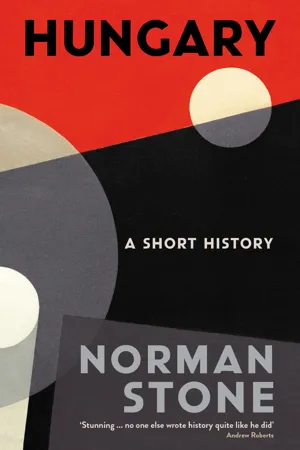
- English
- ePUB (mobile friendly)
- Available on iOS & Android
About this book
The victors of the First World War created Hungary from the ruins of the Austro-Hungarian empire, but, in the centuries before, many called for its creation. Norman Stone traces the country's roots from the traditional representative councils of land-owning nobles to the Magyar nationalists of the nineteenth century and the first wars of independence.
Hungary's history since 1918 has not been a happy one. Economic collapse and hyperinflation in the post-war years led to fascist dictatorships and then Nazi occupation. Optimism at the end of the Second World War ended when the Iron Curtain descended, and Soviet tanks crushed the last hopes for independence in 1956 along with the peaceful protests in Budapest. Even after the fall of the Berlin Wall, consistent economic growth has remained elusive.
This is an extraordinary history - unique yet also representative of both the post-Soviet bloc and of nations forged from the fall of empires.
Frequently asked questions
- Essential is ideal for learners and professionals who enjoy exploring a wide range of subjects. Access the Essential Library with 800,000+ trusted titles and best-sellers across business, personal growth, and the humanities. Includes unlimited reading time and Standard Read Aloud voice.
- Complete: Perfect for advanced learners and researchers needing full, unrestricted access. Unlock 1.4M+ books across hundreds of subjects, including academic and specialized titles. The Complete Plan also includes advanced features like Premium Read Aloud and Research Assistant.
Please note we cannot support devices running on iOS 13 and Android 7 or earlier. Learn more about using the app.
Information
Table of contents
- Cover
- Title Page
- Copyright
- About the Author
- Contents
- List of Maps and Illustrations
- Preface
- 1. The Setting
- 2. Absolutism and Compromise
- 3. Dualism, 1867–1914
- 4. War and Revolution
- 5. Admiral Horthy
- 6. Communist Take-Over
- 7. ‘A mad old man’, 1948–56
- 8. Kádár
- 9. The 1980s and Beyond
- Notes
- Select Bibliography
- Index